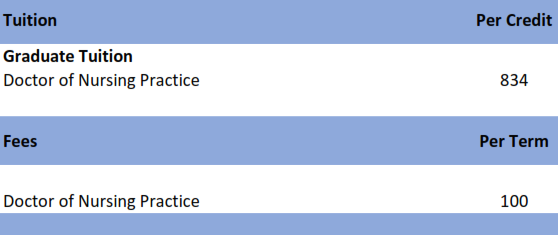Concentration Overview
The Doctor of Nursing Practice in Nursing Health Systems Nurse Executive Leadership is designed for BSN- and MSN-prepared, registered nurses interested in pursuing advanced leadership positions in a variety of health care settings at the executive level. The goal is to prepare nursing leaders to inform health care delivery by equipping them with the capacity to identify and solve problems, improve access to care complexities, manage operational efficiencies and increase patient safety in the health care environment. Graduates will be prepared to assume roles in executive management within health systems. Upon graduation and completion of the required work experience, graduates may be prepared to take the American Nurses Credentialing Center (ANCC) and the American Organization of Nurse Leaders (AONL) exams to become certified in Nursing Leadership.
Concentration Highlights
The Health Systems Executive Leadership DNP curriculum focuses on the knowledge and skills needed to lead complex clinical environments effectively including.
- Understanding organizational behavior
- Implementing evidence-based management, practice, and quality improvement
- Integrating leadership in complex system
- Utilizing principles of finance and healthcare economics for strategic planning
- Facilitating health policy
- Incorporating data analytics and population health into clinical systems design
Students complete a leadership practicum or residency with a senior-level mentor. This newly designed curriculum meets the New AACN Essentials for graduate nursing programs at the level 2 competencies.
Sample Course Sequence
NOTE: Courses and sequencing are subject to change.
Didactic 1 credit hour = 15 contact hours
Clinical 1 credit hour = 60 clinical contact hours
Total contact hours = 1500
| Term 1 | Credit Hours | Didactic Contact Hours | Clinical Contact Hours |
| NURS 6420 Health Promotion Theory & Population Health | 3 | 45 | - |
| NURS 6523 Foundations of Scholarly Writing and Evidence-Based Practice | 3 | 45 | - |
| TERM 2 | |||
| NURS 6327 Health Systems Policy | 3 | 45 | - |
| NURS 6500 Leadership & Collaboration for Quality & Safety | 3 | - | - |
| TERM 3 | |||
| NURS 5110 Pharmacotherapeutics | 3 | 45 | - |
| NURS 5812 Designing Care Delivery Alternatives * | 3 | 30 | 60 |
| TERM 4 | |||
| NURS 5101 Advanced Pathophysiology for Primary Care | 3 | 45 | - |
| NURS 6325 Informatics, Economics, & Financial Principles | 3 | 30 | - |
| TERM 5 | |||
| NURS 5121 Advanced Health Assessment * | 3 | 30 | 60 |
| NURS 6240 Systems-Based Practice & DNP Project I * | 3 | 30 | 60 |
| TERM 6 | |||
| NURS 5811 Applied Economics and Finance for Health Systems | 3 | 45 | - |
| NURS 6527 Strategic Planning ** | 3 | 45 | 120 |
| TERM 7 | |||
| NURS 6526 Quality and Performance Improvement in Health Systems ** | 3 | 45 | 120 |
| NURS 6525 Leadership and Management Practicum *** | 3 | - | 180 |
| TERM 8 | |||
| NURS 6241 Systems-Based Practice & DNP Project II ** | 3 | 15 | 120 |
| NURS 6524 Executive Preceptorship *** | 3 | - | 180 |
| TERM 9 | |||
| NURS 6242 Systems-Based Practice & DNP Project III ** | 3 | 15 | 120 |
| TOTAL | 51 | 480 | 1020 |
Admissions Requirements
The following items are required when applying to the Doctor of Nursing Practice: Health Systems Population Health Leadership concentration:
- BSN from a regionally accredited institution of higher education
- Transcripts from all post-secondary schools attended
- Cumulative GPA from undergraduate work 3.0 or above on a 4.0 scale
- Unencumbered/unrestricted RN License to practice in Missouri
- Two Professional references from individuals who can address academic skills including oral and written communication skills and clinical competence
- Current CV or Resume
- A personal statement of personal attributes and experiences that will help you be successful in this program.
The Admissions Department may provide a 10-year forgiveness for cumulative GPA calculation. The student should submit a petition for forgiveness of prior grades to the Admissions Department.
Tuition and Fees
Barnes-Jewish College Goldfarb School of Nursing reserves the right to adjust tuition and fees at any time. For additional information, please contact our Business Office.

Request Information
Request more information by filling out the form below.

